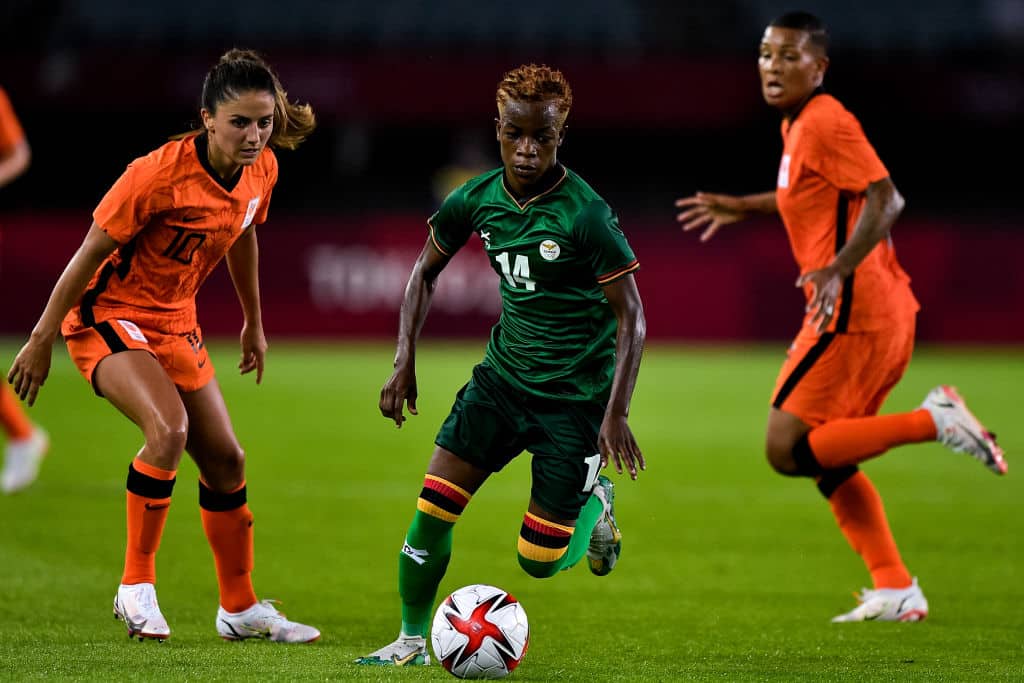It is often said that women’s football will not develop and grow until teams are given more international fixtures to play, and Zambia’s Copper Queens are the shining example of this. One of their current stars is goal-scoring midfielder Ireen Lungu.
ZAMBIAN WOMEN’S FOOTBALL HAS SEEN A meteoric rise in the last 12 months, culminating in the country’s first-ever qualification for the 2023 FIFA Women’s World Cup that will be staged in Australia and New Zealand.
The side is reaping the reward of their own hard work, but also the exposure they gained to the international stage when they managed to qualify for the Olympic Games held in Tokyo last year. It is often said that women’s football will not develop and grow until teams are given more international fixtures to play, and Zambia’s Copper Queens are the shining example of this. One of their current stars is goal-scoring midfielder Ireen
Lungu, who played every minute at the Olympics and followed that up by playing all six games as Zambia took the bronze medal at the 2022 Women’s Africa Cup of Nations (WAFCON) and in doing so qualified for the World Cup.
She paints a picture of a side who were fearful to play on the international stage, but have gained confidence with every outing they have had.
“The Olympics was where it started, that experience we had, and we carried that into the WAFCON and gained even more from that tournament,” Lungu tells FORBES AFRICA.
“We came up against some great players and that took our confidence to another level again.
“But the Olympics’ experience was tough. Many of us had never played against white people before, but after the first game, where we lost 10-3 to Netherlands, that actually boosted our confidence. It sounds strange, but it did.
“We could see the level and felt that we could go higher ourselves. In every game after that we improved and that
removed the fear we had from every player. It turned into a great tournament in terms of helping us to grow and improve.
“If I look at how we have progressed from before then, we sometimes struggled to display our best football but now we have a lot of players who have competed at the highest level.
“Everyone [back home] now wants to compete and be part of the national team, which makes for greater competition among players.”
That was not the only highlight for Zambian football. Lungu’s club Green Buffaloes recently qualified for the CAF Women’s Champions League in Morocco later this year, and in doing so beat current African champions Mamelodi Sundowns, who had a star-studded line-up.
It is yet more continental exposure for Zambian football.
“We were so happy to beat Mamelodi Sundowns, they are a good team with quality players compared to what our clubs have back in Zambia,” Lungu says. “That’s because in South Africa there are many sponsors [for women’s football] compared to what we have at home.
“That is starting to change, there is sponsorship coming in and now it is up to everyone to show that improvement and why corporates should invest in women’s football.”
Lungu says the changing face of the game in Zambia is pleasing, as is the multitude of opportunities offered to young girls compared to when she started out and was forced to play in boys’ teams.
Though she credits that for her rapid development.
“I started playing in 2007 when I was still in Primary School. I used to play with the boys there. There was no girls’ teams where I was staying back then so I was very used to playing with and against boys. That was my only choice,” she says.
“When there was the chance to play with girls, I actually found it very hard to do so because all I had known to that point was playing with boys. It was a big adjustment. I tried to find a better team with girls who knew how to play football. I found the standard too low.”
She also admits to the fact that, certainly 15 years ago, attitudes towards women playing the sport were not as they are today.
“It was quite tough because where we come from the parents don’t want to allow you to go and play [if you are
a girl], so it was very hard for me. But I had to stand up for myself and say, ‘this is what I want and nothing will stop me from playing’.
“I am where I am today because of determination and discipline. I am also a very hard-working player.”
She will hope a positive showing at the World Cup puts her in line for a contract abroad, and with it the chance to go fully professional as a footballer.
“That’s the thing now I am pushing for now. I don’t want to be in my country anymore, I want to go and play in new leagues. That is a big ambition of mine and something I have to work extra hard towards,” she says.
“I would like to go to any country as long as there is competition, but Spain looks like a good option. I want to compete with great players so that I can improve my own level.”
